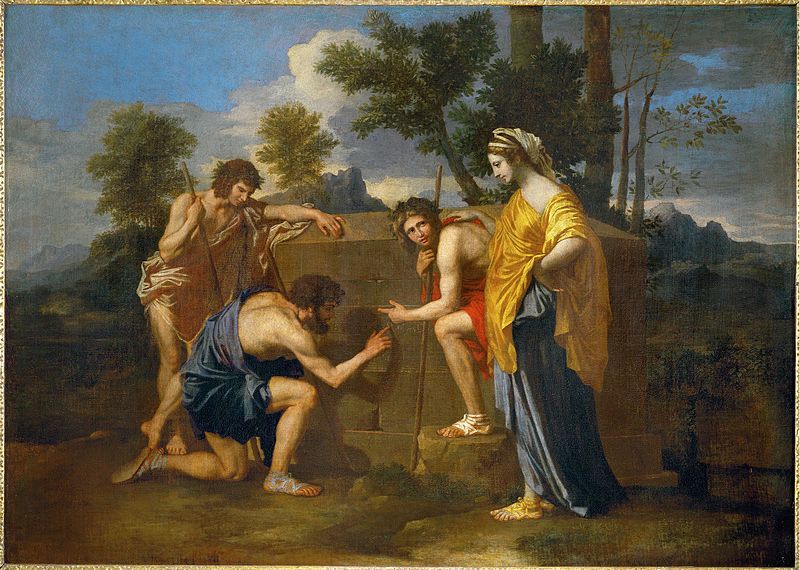
-“Et in Arcadia ego” (also known as Les bergers d’Arcadie or The Arcadian Shepherds) is a 1637–38 painting by Nicolas Poussin (1594–1665). It depicts a pastoral scene with idealized shepherds from classical antiquity clustering around an austere tomb. It is held in the Louvre, Paris.
I volunteer in hospice, and with dementia/alzheimer’s patents. It is a profound understatement to say it is humbling, sobering, heart & thought provoking work. In particular, I volunteer for what is known as “vigil” service. This is providing others human companionship, on a continuous basis around the clock in the last hours or days, typically, of their lives. I would hope someone would do it for me. In particular, we try to relieve family members during non-waking hours, to give them rest and respite. To give them peace that their loved one is not alone, and should they pass when family, if any, is not present no one should die alone. Our work brings relief to both family and medical staff who have too much responsibility for others to offer this human compassion, although they desperately desire to offer it, during their regular duties.
I may read to patients/residents appropriately for their faith or lack of faith persuasion, particularly scripture, both Old and New Testaments, or just Hebrew scriptures if Jewish. But, if not religious, whatever text they may have of their own, that brings them comfort. If Catholic, I may say the rosary or Divine Office/Liturgy of the Hours/Office of the Dead for them. Sometimes, I play soft music. Often, those “actively dying” are non-communicative, but not always, most definitely not always. Hearing is known to be the last sense to succumb.
I also teach young people. It is a profound, lived experience in mid-life to spend the day with young people at the prime of their health and beauty, typically, their joyfulness, their silliness, their boundless energy, their certain joie de vivre, their understandable lack of care about the future and their health, their strength, their goofiness, their playfulness, their love of talking to, with, and about each other, constantly, and then to journey just a few minutes to my service for the dying, their diminishment, their humiliation, shame, despair, at their profound inability to care any longer for self, let alone others; they who ruled the world a short time ago. It reminds me of one of my favorite poems, which I find myself self-repeating to myself, as I drive.
Ozymandias – by Percy Bysshe Shelley, Jan 1818
“I met a traveller from an antique land
Who said: Two vast and trunkless legs of stone
Stand in the desert. Near them, on the sand,
Half sunk, a shattered visage lies, whose frown,
And wrinkled lip, and sneer of cold command,
Tell that its sculptor well those passions read
Which yet survive, stamped on these lifeless things,
The hand that mocked them and the heart that fed:
And on the pedestal these words appear:
‘My name is Ozymandias, king of kings:
Look on my works, ye Mighty, and despair!’
Nothing beside remains. Round the decay
Of that colossal wreck, boundless and bare
The lone and level sands stretch far away.”
So much for the glory of man.
Or, from my favorite poet, Sara Teasdale’s, “November”: “The world is tired, the year is old, the faded leaves are glad to die.” Yes, they are. Yes, they are. Yes, I will.
“We are all going to die.
We were reminded of this on Ash Wednesday when the priest put ashes on our heads saying, “Remember that you are dust, and to dust you shall return.” We need to be reminded about the reality of our death because we forget so easily.
Our culture desensitizes us to the fact of dying. It makes death seem so commonplace as to be almost unbelievable—or, at least, so prevalent that we think it could never really happen to us.
We see this in action movies where the death of combatants costs nothing: sure, a couple of those soldiers got blown up, but we didn’t really know them; they weren’t really central to the story. The good guys win, and we forget about the dead. We also see it in video games where players can continuously get killed and then “re-spawn” at no cost.
The point of receiving ashes, then, is to remind us that we are going to die someday. But do we really let that sink in? If we don’t ignore the question, it should naturally occur to us to ask: “well, if I’m going to die, what’s next? Does my life really have any meaning?”
Obviously, for the Christian, the answer is a resounding “of course.” Our life is given meaning by the promise of an eternity of happiness with God, greater than anything beyond our wildest dreams. But life doesn’t just have meaning because of the promise of something we will eventually receive but currently lack.
Those in the state of grace possess immortality now by sharing in the eternal life of God Who dwells deep within the soul. St. Augustine says that God is “more inward in me than my inmost self.” When we recognize that the Undying One wants to dwell deep within us, we begin to glimpse the true meaning He can give to our lives. But we only arrive at this recognition if we open ourselves to this reality and conform ourselves to His love.
At baptism, this most intimate, immortal indwelling of God is planted in the soul like a seed. Through frequent reception of the sacraments (especially Holy Communion and confession), God cultivates this indwelling presence so that it will blossom into a fruitful tree when the soul reaches Heaven. But we forget so easily that His immortal life can be within us; and, as a result, we also forget the true meaning of our lives.
Our consumerist lifestyle tends to bury the question of our origin and our end: it’s a defense mechanism meant to self-medicate us against the fear of not having answers to such fundamental questions. But Lent is a chance to remember—not only our impending death—but the reality that the God who never dies can live within our souls and can invite us to share that life with Him.
So how does Lent jog the memory? The three pillars of Lenten (and, really, Christian) observance are prayer, fasting, and almsgiving. Fr. Francis Martin teaches that we pray so that we can relate to God; we fast so that we can deprive ourselves; and this self-deprivation prepares us for almsgiving.
The idea behind this is that human beings are self-centered. We eat up everything: food, money, time, clothes, TV. But fasting counteracts that selfish tendency of our fallen nature. Depriving ourselves prepares us to give of ourselves and thus grow in charity (that is, love, the life of God within us). Counteracting our own selfishness prepares us, for instance, to be patient with those who annoy us and kind to those we can’t stand.
So fasting prepares us for almsgiving, but neither have a context without prayer—without recognizing and communicating with the God Who dwells deep in the souls of His faithful ones.
The lesson of Lent, then, is to remember death. But remember death so that you also remember that the immortal God wants to live within you so that you may share in His undying life. Doing so will remind you of the meaning of your own life.”
Love, & the joie de vivre,
Matthew

